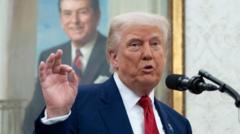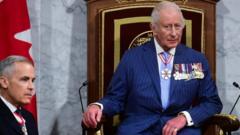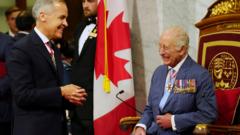Former Governor of the Bank of Canada, Mark Carney, won a narrow victory for the Liberals, setting the stage for potential friction with the United States under President Trump’s leadership.
Canada Elects Mark Carney: A New Era of Leadership

Canada Elects Mark Carney: A New Era of Leadership
Mark Carney has emerged victorious in Canada’s recent election, raising significant discussions on trade and national sovereignty.
Mark Carney, former central banker and newly elected Prime Minister for the Liberal Party, secured a closely contested victory in Canada’s election held on Monday. This success marks a significant moment for Carney, who has assumed leadership in an era marked by an increasingly complicated relationship with the U.S., particularly concerning trade policies and national sovereignty.
In his acceptance speech delivered early Tuesday in Ottawa, Carney adopted a defiant stance towards American influences, directly addressing President Trump's previous comments insinuating that Canada could become the 51st state. “America wants our land, our resources, our water, our country. Never. President Trump is trying to break us so that America can own us. That will never — that will never, ever happen,” Carney declared firmly.
Despite winning the election, details on the Liberal Party's seat majority in the House of Commons remain uncertain. Carney may face challenges as he navigates legislative sessions without a clear majority, potentially relying on smaller parties for support.
Carney’s campaign heavily focused on confronting President Trump’s tariffs on Canadian goods, which he argued must be met with retaliatory measures. Although he expressed a willingness to uphold retaliatory tariffs, Carney also noted that extending these measures could ultimately hurt Canadian citizens more than they would impact Americans.
While Carney has yet to meet President Trump since assuming his role, he indicated they had a professional phone conversation during which trade tensions were discussed. The Canadian public is now awaiting to see how Carney’s leadership will shape Canadian-American relations going forward. As his government sets out its agenda, all eyes will be on Carney's approach to managing trade disputes, especially in light of the predominant influence Trump has in U.S. politics.
In his acceptance speech delivered early Tuesday in Ottawa, Carney adopted a defiant stance towards American influences, directly addressing President Trump's previous comments insinuating that Canada could become the 51st state. “America wants our land, our resources, our water, our country. Never. President Trump is trying to break us so that America can own us. That will never — that will never, ever happen,” Carney declared firmly.
Despite winning the election, details on the Liberal Party's seat majority in the House of Commons remain uncertain. Carney may face challenges as he navigates legislative sessions without a clear majority, potentially relying on smaller parties for support.
Carney’s campaign heavily focused on confronting President Trump’s tariffs on Canadian goods, which he argued must be met with retaliatory measures. Although he expressed a willingness to uphold retaliatory tariffs, Carney also noted that extending these measures could ultimately hurt Canadian citizens more than they would impact Americans.
While Carney has yet to meet President Trump since assuming his role, he indicated they had a professional phone conversation during which trade tensions were discussed. The Canadian public is now awaiting to see how Carney’s leadership will shape Canadian-American relations going forward. As his government sets out its agenda, all eyes will be on Carney's approach to managing trade disputes, especially in light of the predominant influence Trump has in U.S. politics.






















